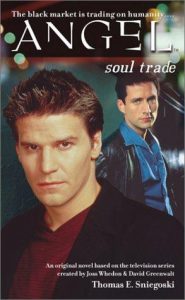Although Thomas E. Sniegoski is a prolific Buffyverse writer, “Soul Trade” (May 2001) – the seventh original novel in the “Angel” series – is his only solo work. The other entries on his resume are collaborations with Christopher Golden. That’s not to say Golden does the heavy lifting in those collaborations; for example, Sniegoski notably improves the Dark Horse “Angel” comics when he joins the team about halfway through.
Still, maybe he does work better with a teammate, because “Soul Trade” is a mundane entry in the “Angel” line. It’s not bad by any means: Sniegoski effortlessly transfers his writing skills to this new medium, penning a brisk and fun page-turner with a few interesting talking points. But it doesn’t stand out in the pantheon of Buffyverse spinoff fiction, and during some visually driven moments, I felt it would’ve played better in comic form.
As the title suggests, this case is personal for the vampire with a soul. He must track down the soul of a young girl, who had it sucked out of her body to be sold as part of the underground soul trade. Similar to the “Buffy” comic arc “Note from the Underground” (Issues 47-50), demons named Meskal and Shugg steal people’s souls to process into an addictive drug, which they then sell. Also, they use the souls to extend their own lifespans.
In “Soul Trade,” the soul is treated as a life force. Young Aubrey is in a coma without her soul – alive but not functioning. This is different from “I’ve Got You Under My Skin” (1.14), when Angel encounters a boy born without a soul. In that episode, the soul is the empathy center; the boy is physically healthy, but he’s evil. That jibes with Angel’s situation, although his is even more extreme because Angelus possesses him when his soul is gone – arguably doubling his evilness. The soul serves the twofold purpose of keeping Angelus at bay and forcing Angel to think about his treatment of other people.
So one could argue that “Soul Trade’s” interpretation of the soul as a life force contradicts the established mythology. Or one could be generous and say Meskal’s soul collector extracts the life-force portion of the soul, which is different from the empathy portion.
Still, this case has emotional ties to Angel’s past. In the vampire’s dreams, Aubrey perches on the grave of Katherine, Angel’s sister (whom he killed – along with his parents – upon being turned). We see flashbacks to tender moments between Liam and Kathy, a refreshing rarity since Kathy only appears on screen in one episode, “The Prodigal” (1.15). When Angel sees Aubrey’s soul in a stoppered vial, or let loose to fly about, he marvels at the beautiful colors; this might’ve worked better on TV, with some music to go with it. Here, there’s a slight sense that Sniegoski is trying too hard.
Meskal’s behavior is the standard villainous fare where he terrorizes his underlings – magic-created homunculi in this case – and generally only thinks about extending his lifespan and power. Shugg is a bit more interesting, as Sniegoski paints a horrific picture of a corpulent soul-eating beast with parasitic bats attached to him; those parasites remove the impurities from his body when he consumes a soul. The author attempts to humanize Shugg by making him a fan of daytime game shows, but the gag lands a bit flat.

Cordelia and Doyle are used fairly well in “Soul Trade,” although I don’t recall Cordy having an obsession with a neatly organized desk elsewhere in the saga. The author phonetically spells out Doyle’s brogue-inflected words in his dialogue, which is weird at first but not too distracting. And it is nice to see Doyle’s ex-wife Harry again, although she only appears briefly to give Doyle some demonology schooling.
Aubrey’s bedraggled mother June inadvertently stops Angel from wrapping up this case twice, making her somewhat annoying and also giving the story an air of inevitability. Yes, Angel will eventually save the day in the way you expect, but he can’t do so until after the 300-page mark.
While it’s sometimes padded and predictable, there’s enough engaging stuff in here to make “Soul Trade” worth reading, notably the way this case is personal to Angel and the way Sniegoski takes a different tack toward the definition of a soul than the rest of the saga.
Click here for an index of all of John’s “Buffy” and “Angel” reviews.

